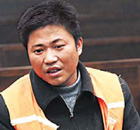Government and Policy
Mainland's clout a worry for islanders
By Xing Zhigang (China Daily)
Updated: 2009-12-24 07:35
 |
Large Medium Small |
TAICHUNG, Taiwan: Many islanders, even those who favor closer ties, seem to be uneasy at the mainland's 'Big Brother' status in the cross-Straits relationship.
"The mainland is so big and Taiwan is so small," said a shuttle bus driver, whose forebears are from the southeastern province of Fujian on the mainland. "They are brothers, but we hope the big one does not bully the little one."
This kind of reasoning was also evident among the Taiwan negotiators during the ongoing fourth round of cross-Straits talks, which started on Monday.
Negotiators of Taiwan's Straits Exchange Foundation (SEF) took every opportunity to deliver the message that cross-Straits negotiations should be conducted on equal footing.
"We hope the mainland fully considers the different size of the two sides and addresses all issues with a broad perspective," said Kao Koong-lien, SEF vice-chairman, on the first day of the talks.
The fear of unequal treatment is clear on the economic front, given the island's growing economic dependence on the mainland.
More than 500,000 people from the island, which has a population of 23 million, now work and live on the mainland.
Concern over Taiwan playing second fiddle has even prompted widespread protests at a time when top negotiators have sat down to hammer a free-trade deal that will bring the two sides closer.
If signed, the Economic Cooperation Framework Agreement, or ECFA, will help reduce the island's restrictions on mainland trade, products and investment.
The opposition Democratic Progressive Party (DPP) has blamed the ruling Kuomintang for "selling out Taiwan", citing massive potential job losses.
In an apparent move to assuage the concerns, Beijing's top envoy, Chen Yunlin has repeatedly assured that the deal was not something the mainland would force upon the island.
"It's understandable that some people in Taiwan feel concerned about the agreement," said Chen, while speaking to a business group in Taichung yesterday. "But there's no need to be afraid. We need time to sort out the problems."













